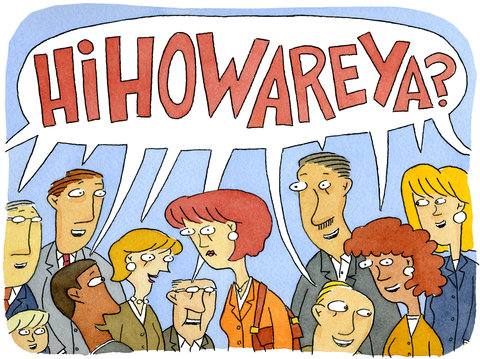I couldn't remember what "phatic" meant so I looked it up. And then I found a NYT article that I really liked.
In linguistics, a phatic expression (English: FAT-ik) is a communication which primarily serves to establish or maintain social relationships.
archive.today • Hihowareya? We Asked, and You Answered - The New York Times
By Emily S. Rueb
May 24, 2010
When you ask someone "how are you," do you really care?
As Jennifer Seager wrote in this weekend's Complaint Box in the Metropolitan section, people don't.
"Where was I on the day that "hihowareya" became one long word devoid of meaning? I must be asked at least 10 times a day how I am, but I have yet to find one person who actually wants to know. This drives me absolutely crazy."
"I had not realized how much the pointlessness of this much-repeated phrase annoyed me until last summer," she wrote, "when I came upon a lady on the street who was walking with her head down. As we approached each other, she suddenly looked up and asked 'Hihowareya?' I was pleasantly surprised by this sudden inquiry about my well-being. But before my brain could conjure up an answer, she had walked right on by."
It's a strangely meaningless gesture that one should never extend during a time of grieving or sickness, but many readers sought to ascribe a deeper meaning to this seemingly innocuous phrase.
Anyone who has learned a Romance language knows that this greeting has a textbook reply, but Americans have yet to adopt a uniform response, which drives English scholars and protectors of the language mad. The response should be "very well, thank you." But others say it's a vestige of a bygone era, when men wore bowler caps and ladies carried dainty umbrellas to shield their delicate skin from the sun's rays. But like many of these dressed-up customs and traditions in our culture, "How do you do?" has come to be like a silent consonant in our loud vernacular.
But maybe it's a geographic thing, as a few Texans suggested. Away from the coasts, they say, the gesture is accepted with grace and aplomb. It's also very American. One reader pointed out that in Chinese, a common way of saying hello is to ask if you've eaten. But you're not expected to answer.
Still, the greeting is a ritual courtesy. "It's not designed to elicit your true state of mind or body, in which nobody but friends and family (and not always them) is interested," wrote SKV. "The response is, 'Finehowryou?' and you don't have to wait for details."
Here, unedited, are several comments we especially liked:
An Invitation
I always take the question at face value and give a hearty but polite assessment of my current state of being. Then I return the question, and nearly every person responds with their own self-report, old guys with ironed-in frowns being the chief exception. Such exchanges always make me feel good. Courtesy isn't dead, exactly, just in hiding, waiting for an invitation.
I may sound pollyanna. Wrong. I'm a cynical ad copywriter. But a world of people is what I've got, so I make the best of it.
— J
Goodnyou
The answer to "Hihowareya?" is "Goodnyou?"
No need to work yourself into a snit about it.
— Kimiko
Phatic Communication
The author is describing what linguists classify as "phatic communication" or "small talk." No need to get upset. It's a way of greeting each other. Perhaps the best response is "Do you really want to know?" If the answer is yes, then the conversation can become "emphatic."
— T.G.
A Harmless Greeting
I'm with #16 — while the perso asking may not really care about my answer, I do appreciate the acknowledgment that someone other than them exists.
We walk about NY everyday whipping right by people who could – if we stopped for one second – end up being good friends, colleagues, old school friends, etc etc.
If someone considers saying the short "hihowareya", I'm okay with that — it creates a split second connection that could do a lot of people a lot of good.
— Nas

Yes.... I just take it somewhat literally... if anyone were to take it only by its connotation, it would just seem awkward to me
I just say "So, how are you doin'?"
I find it funny and baby-brained for some to argue on this. Yk, it depends on your mileage, and to argue on this feels as ridiculous like this video
It's just simple as.
I found a YouTube link in your comment. Here are links to the same video on alternative frontends that protect your privacy: